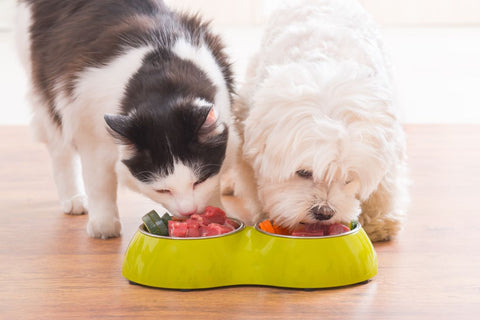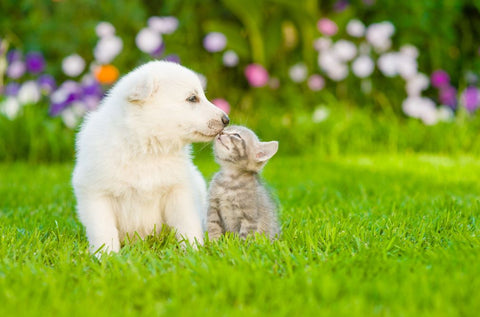

Feline & Canine Detox Methods for a Happy, Healthy Pet
Key Highlights
- Toxins can cause health problems in pets, and it's important to understand how they can be exposed to toxins in their environment.- Detoxifying pet's body can help improve their overall health and well-being.- Hydration and exercise play a crucial role in the detoxification.
- Adjusting your pet's diet to include detoxifying foods and herbal supplements can support their liver health.
- Taking steps to reduce household toxins and create a toxin-free space for your pet is essential.
Introduction
Pets are part of our families, and we want them to live long, healthy lives. However, our furry friends can be exposed to various toxins in their everyday lives, which can have a negative impact on their health. From environmental toxins to the toxins they encounter in their food and water, such as heavy metals like lead, mercury, cadmium, arsenic, aluminum, and nickel, it's important to understand how these substances can affect our pets and what we can do to help them detoxify.
Detoxification is the process of removing harmful substances, or toxins, from the body. Just as humans can benefit from a detox, so can our pets. By supporting their bodies' natural detoxification processes, we can help improve their overall health and well-being.
In this blog, we will explore the common environmental toxins that pets encounter, how they can be exposed to toxins daily, and the basics of detoxifying their bodies. We will also discuss the role of hydration and exercise in the detoxification process, as well as the importance of diet adjustments and herbal supplements for supporting liver health. Additionally, we will provide tips on creating a toxin-free space for your pet by reducing household toxins. Let's dive in and learn how to support the detox process for our feline and canine friends for a happy, healthy pet.
Understanding Pet Toxins and Their Sources
Toxins can cause, worsen, or accelerate many health problems in both humans and pets. Our pets can be exposed to environmental toxins from various sources, leading to a toxic load in their bodies. Environmental toxins include pesticides, air fresheners, and flea products, among others. It's important to be aware of these toxic substances and their potential harm to our pets. By understanding the sources of pet toxins, we can take steps to minimize their exposure and support their overall health.
Common Environmental Toxins in Spring
During the spring season, there are several common environmental toxins that pet owners should be aware of. Pesticides used for gardening and lawn maintenance can be harmful to pets if ingested or absorbed through their paws. Air fresheners, including plug-ins and scented candles, may contain chemicals that can irritate your pet's respiratory system. Flea products, such as topical treatments and collars, often contain toxic substances that can have adverse effects on your pet's health. It's crucial to read product labels and choose pet-friendly alternatives whenever possible. By being mindful of these common toxins in spring, you can help create a safer environment for your furry friends.
How Pets Encounter Toxins Daily
Pets encounter toxins daily through various means. Cleaning products, such as household cleaners and disinfectants, often contain chemicals that can be harmful to pets if ingested or inhaled. Similarly, laundry products, including detergents and fabric softeners, may leave residue on your pet's bedding or toys, which can be toxic if licked or chewed. These everyday exposures can contribute to the toxic load in your pet's body. By using pet-friendly and non-toxic alternatives, you can reduce their exposure to harmful substances and support their overall health.
articlebanners1
The Basics of Detoxifying Your Pet
Detoxifying your pet's body involves supporting its natural detoxification processes to eliminate toxins and promote overall health. A gentle detoxification approach focuses on enhancing the organs of elimination, such as the liver, kidneys, lungs, intestines, and skin. These organs play a crucial role in eliminating toxins from the body, and it's important to take care of your pet's organs to ensure their health and well-being. By supporting your pet's immune system and providing the necessary nutrients and supplements, you can help optimize its detoxification process and reduce the strain on your pet's organs. It's important to keep in mind that detoxification should be approached gradually and with guidance from a veterinarian to ensure your pet's safety and well-being.
The Role of Hydration in Detoxification
Hydration plays a vital role in the detoxification process for pets. Adequate water intake helps flush toxins out of the body through the urinary tract. The kidneys, in particular, are responsible for filtering waste products and toxins from the bloodstream. By ensuring that your pet stays well-hydrated, you are supporting its kidneys' function and promoting detoxification. Encourage your pet to drink plenty of clean, filtered water throughout the day. If your pet is reluctant to drink water, consider adding moisture to its diet through wet food or bone broth. Proper hydration is essential for maintaining your pet's overall health and supporting its detoxification processes.
Importance of Exercise in Eliminating Toxins
Regular exercise is not only important for your pet's physical fitness but also plays a significant role in eliminating toxins from its body. During exercise, your pet's body increases blood circulation and breathing rate, allowing for effective toxin removal. Physical activity stimulates the detoxification process by supporting the lymphatic system, which helps remove waste and toxins from tissues. Additionally, exercise promotes sweating, which aids in the elimination of toxins through the skin and fresh air. By providing your pet with regular exercise and exposure to fresh air, you can help optimize its detoxification process and improve its overall well-being.
Diet Adjustments for Detox
One of the most important aspects of detoxifying your pet's body is making appropriate diet adjustments. By providing a balanced and nutritious diet, you can support their liver's detoxification process. Include foods that are rich in antioxidants, such as healthy vegetables, to help neutralize free radicals and reduce oxidative stress. Amino acids, found in high-quality proteins, are essential for supporting liver detoxification pathways. It's also important to avoid processed foods and artificial additives, as these can contribute to the toxic load on your pet's liver. Consult with your veterinarian to create a diet plan that best suits your pet's specific needs.
Choosing the Right Foods for Detox: Antioxidants
When it comes to choosing the right foods for detoxifying your pet, opt for nutrient-rich options that support their overall health. Healthy vegetables, such as broccoli, kale, and spinach, are packed with antioxidants that help protect cells from damage caused by toxins and support your pet's health. These vegetables also contain fiber, which aids in digestion and helps eliminate waste from the body, promoting your pet's health. Including fruits like blueberries and cranberries can also provide a boost of antioxidants and help detoxify the body, contributing to your pet's health. Additionally, consider incorporating herbs like cilantro and parsley into your pet's diet, as these have natural detoxifying properties that can benefit your pet's health. Remember to introduce new foods gradually and consult with your veterinarian for specific dietary recommendations based on your pet's individual needs and to ensure optimal pet's health.
Herbal Supplements to Aid in Detoxification
Herbal supplements can be a valuable addition to your pet's detoxification routine. Milk thistle is a popular choice for supporting liver health and detoxification. It contains a compound called silymarin, which helps protect liver cells from damage caused by toxins and promotes the regeneration of healthy liver tissue. Other herbs, such as dandelion and burdock root, can also assist in the detoxification process by stimulating liver function and aiding in the elimination of waste products from the body. These supplements, including Milk Thistle, are essential for supporting your dog’s liver and overall detoxification. Always consult with your veterinarian before introducing any new supplements to ensure they are safe and appropriate for your pet's specific needs. They can guide you on the proper dosage and help monitor your pet's progress.
articlebanners2
Enhancing Your Pet's Liver Health
Optimal liver health is essential for your pet's overall well-being and detoxification process. The liver is responsible for filtering toxins from the bloodstream and metabolizing them for elimination. Supporting liver function can be achieved through a combination of diet, exercise, and supplementation. A balanced diet that includes high-quality proteins, antioxidants, and essential fatty acids can help nourish the liver and promote its detoxification abilities. Regular exercise aids in blood circulation, promoting the efficient functioning of the liver. Additionally, herbal supplements like milk thistle can provide targeted support for the liver and help improve its detoxification capabilities.
Herbs That Support Liver Function
Certain herbs can provide valuable support to your pet's liver function and aid in the detoxification process. Milk thistle is one such herb that has been used for centuries to promote liver health. It contains an active compound called silymarin, which has antioxidant and anti-inflammatory properties. Silymarin helps protect liver cells from damage, stimulates the production of new liver cells, and aids in the elimination of toxins from the body. Other herbs like dandelion root and burdock root can also support liver function by promoting bile flow and aiding in the detoxification process. These herbs can be administered in the form of herbal supplements or incorporated into your pet's diet under the guidance of a veterinarian.
Foods to Cleanse the Liver
Including specific foods in your pet's diet can help cleanse and support the liver's detoxification process. Healthy vegetables like broccoli, Brussels sprouts, and cauliflower are rich in sulfur compounds that aid in liver detoxification. Leafy greens such as spinach and kale provide essential nutrients like vitamins A, C, and K, which support liver health. High-quality proteins, like lean meats and fish, provide amino acids that are crucial for liver detoxification pathways. Additionally, foods rich in antioxidants, such as blueberries and pomegranates, can help protect the liver from damage caused by free radicals. Consult with your veterinarian to determine the appropriate amounts and types of foods to incorporate into your pet's diet to support liver health and detoxification.
Supporting the Kidneys Through Diet and Hydration
The kidneys play a vital role in eliminating toxins from your pet's body. To support kidney function and promote detoxification, it's important to focus on diet and hydration. Ensure your pet has access to clean, filtered water at all times to promote proper kidney function and prevent dehydration. Additionally, incorporating foods that support kidney health, such as low-phosphorus options like fish and poultry, can be beneficial in preventing kidney disease. Avoiding excessive salt and processed foods can also help reduce the workload on the kidneys. Consult with your veterinarian for specific dietary recommendations based on your pet's individual needs and any pre-existing kidney conditions.
Natural Diuretics for Pets
Natural diuretics can aid in supporting the kidneys and promoting detoxification in pets. Diuretics help increase urine production, which can assist in flushing out toxins from the body. Some natural diuretics suitable for pets include dandelion leaf, parsley, and celery seed. These herbs can be added to your pet's diet or prepared as a herbal tea. However, it is important to consult with your veterinarian before introducing any new herbs or supplements, especially if your pet has pre-existing kidney conditions. Your veterinarian can provide guidance on proper dosage and usage based on your pet's individual needs.
Ensuring Adequate Water Intake
Proper hydration is crucial for supporting your pet's overall health and aiding in the detoxification process. The kidneys play a key role in filtering toxins from the bloodstream and excreting them in the urine. Adequate water intake helps maintain optimal kidney function and flushes out waste products from the body. Ensure your pet has access to clean, filtered water at all times, especially during warmer months or if they have an increased activity level. Encourage your pet to drink water by providing fresh water in multiple locations and considering the use of pet water fountains. If you have concerns about your pet's water intake or suspect dehydration, consult with your veterinarian for guidance and appropriate hydration strategies.
articlebanners3
Boosting Gastrointestinal Health
A healthy gastrointestinal (GI) tract is essential for proper digestion, nutrient absorption, and detoxification in pets. To support GI health, consider incorporating probiotics into your pet's diet. Probiotics are beneficial bacteria that help maintain a balanced gut microbiome. They aid in digestion, strengthen the immune system, and promote detoxification. Probiotics can be found in supplement form or naturally in foods like yogurt and fermented vegetables. Additionally, including fiber-rich foods in your pet's diet, such as pumpkin and sweet potatoes, can help promote regular bowel movements and support a healthy GI tract. Consult with your veterinarian to determine the appropriate probiotic and fiber sources for your pet's specific needs, including supplements for urinary tract and/or kidney support.
Probiotics and Their Role in Detox
Probiotics play a crucial role in supporting the detoxification process in pets by promoting a healthy gastrointestinal (GI) tract. The GI tract, also known as the gastrointestinal system, is home to trillions of bacteria that play a vital role in digestion, nutrient absorption, and immune function. When the balance of beneficial bacteria in the gut is disrupted, it can lead to digestive issues and hinder the detoxification process. Probiotics help restore this balance by replenishing the gut with beneficial bacteria, promoting proper digestion, and enhancing the elimination of toxins. They also support the immune system, which is essential for overall health and detoxification. Introducing a high-quality probiotic supplement or incorporating probiotic-rich foods into your pet's diet can help optimize their GI health and aid in detoxification.
Fiber-rich Foods for Digestive Health
Including fiber-rich foods in your pet's diet is crucial for maintaining a healthy digestive tract and supporting detoxification. Fiber acts as a natural cleanser, promoting regular bowel movements and aiding in the removal of waste products from the body. It helps regulate the digestive system and prevents constipation. Incorporating fiber-rich foods like pumpkin, sweet potatoes, and peas can provide the necessary bulk and promote healthy digestion. These foods also contain essential nutrients that support overall health and detoxification. However, it's important to introduce fiber gradually to prevent digestive upset. Consult with your veterinarian for specific dietary recommendations based on your pet's individual needs and any pre-existing digestive conditions.
Environmental Adjustments for a Toxin-free Space
Creating a toxin-free environment is crucial for the overall health and well-being of your pet. Minimizing exposure to environmental toxins can significantly reduce the toxic load on your pet's body. Make adjustments in your home by avoiding the use of air fresheners, scented candles, and cleaning products that contain harsh chemicals. Opt for natural alternatives or make your own DIY cleaning solutions using ingredients like vinegar, baking soda, and lemon juice. Additionally, consider using non-toxic and eco-friendly pet-safe products for pest control, lawn care, and household cleaning. By taking these steps, you can help create a safe and healthy living space for your pet.
Reducing Household Toxins
Reducing household toxins is essential for creating a safe and healthy environment for your pet. Common household items such as cleaning products, air fresheners, and laundry detergents can contain harmful chemicals that can negatively impact your pet's health. Opt for non-toxic and eco-friendly alternatives to minimize your pet's exposure to these toxins. Consider using natural cleaning products or making your own using ingredients like vinegar, baking soda, and essential oils. Avoid using air fresheners and opt for natural alternatives like fresh flowers or natural scents. By reducing the toxic load in your home, you can help protect your pet from potential health issues associated with household toxins.
Safe Cleaning Products and Pet Detox
Using safe cleaning products is crucial for ensuring the well-being of your pet. Many conventional cleaning products contain harsh chemicals that can be toxic to pets when they come into contact with them. These chemicals can be absorbed through your pet's skin, inhaled, or ingested, leading to potential health issues. Switching to non-toxic and pet-safe cleaning products can help minimize your pet's exposure to harmful chemicals. Look for products that are labeled as non-toxic, eco-friendly, and biodegradable. Additionally, consider making your own cleaning solutions using natural ingredients like vinegar, baking soda, and essential oils. By using safe cleaning products, you can help protect your pet's health and promote a toxin-free environment.
Conclusion
In conclusion, ensuring the well-being of your furry companions involves being mindful of the toxins they encounter daily. From diet adjustments and herbal supplements to promoting liver and kidney health, detoxifying your pets is crucial for their overall happiness and health. Hydration, exercise, and a toxin-free environment play key roles in this process. By incorporating these practices into your pet care routine, you can support their detoxification journey and help them lead vibrant, toxin-free lives. Remember, a healthy pet is a happy pet!
Frequently Asked Questions
What signs indicate my pet needs a detox?
Signs that indicate your pet may benefit from a detox include changes in appetite, chronic inflammation, diarrhea, and exposure to toxins. If your pet is showing these symptoms, it's important to consult with a veterinarian to determine the best course of action and whether a detox is necessary.
How often should I detox my pet?
The frequency of pet detoxification depends on various factors, including your pet's overall health, exposure to toxins, and individual needs. It's recommended to engage in gentle detoxification methods periodically, but the specific timing and duration should be discussed with a veterinarian. They can evaluate your pet's health, immune system function, and provide guidance on the appropriate detoxification schedule.
Can all pets undergo the same detox methods?
Not all pets are the same, and their bodies and organ functions can vary. It's important to consider the specific needs and health conditions of your pet when implementing detox methods. Consult with a veterinarian to determine the appropriate detox approach for your pet, taking into account their individual needs and any underlying health concerns.
articlebanners4




